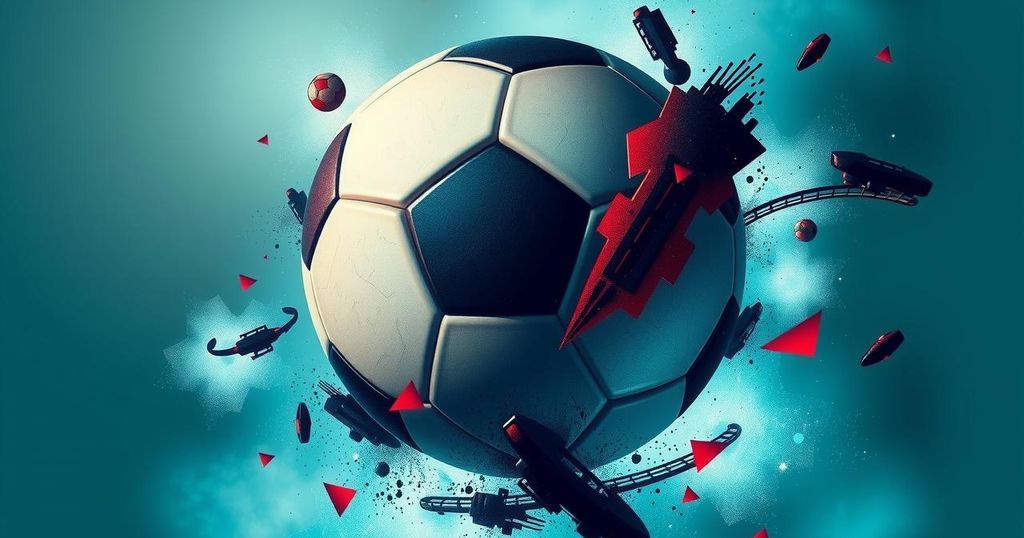Increasing Calls for Suspension of Israel in International Sports

A growing movement calls for Israel’s ban from international sports amid the ongoing Israel-Hamas conflict, fueled by a significant petition, letters from European parliament members, and recent controversies in basketball. Activists compare Israel’s situation to Russia’s suspension after their invasion of Ukraine, accusing sports bodies of double standards. Calls for decisive action urge FIFA and UEFA to reconsider Israel’s participation in upcoming events as international sentiment intensifies against the backdrop of escalating violence.
In recent weeks, there has been a surge in calls to ban Israel from international sports due to the ongoing Israel-Hamas conflict. A petition initiated by The Democracy in Europe Movement 2025 has garnered over 70,000 signatures advocating for Israel’s suspension from sports. With the Paris Olympics nearing and Israeli footballers facing playoff matches, sports governing bodies are under pressure to respond to these demands.
Katarina Pijetlovic, one of the petition’s co-organizers, emphasized the need for organizations like the International Olympic Committee (IOC), FIFA, and UEFA to take action. She stated that the petition aims to apply pressure on the Israeli government through sporting channels.
A letter shared by Irish MEP Chris McManus, endorsed by several parliament members, calls for decisive action from FIFA and UEFA. This follows a statement from the West Asian Football Federation (WAFF) urging similar measures. UEFA president Alexsander Ceferin acknowledged the increasing inquiries regarding Israel’s participation in upcoming sports events.
Israel’s military actions in Gaza have led to significant casualties, with accusations of genocide directed at the Israeli government. In the wake of over 28,000 Palestinian deaths, Israelis assert their right to self-defense against Hamas attacks, which killed over 1,200 Israelis on October 7, 2023. The international discourse regarding sports liabilities reflects a divided narrative concerning Israel and Russia’s actions in their respective conflicts.
Pijetlovic critiqued the differing international responses, comparing the situation to Russia’s suspension from sports following the invasion of Ukraine. She highlighted how international outcry and subsequent actions against Russia starkly contrast with the current treatment of Israel within the sporting community despite a vastly higher toll on Palestinian children.
Currently, Israeli footballers are competing in neutral venues due to security concerns, while FIFA maintains a position of keeping politics separated from sports. Israeli Football Association’s Niv Goldstein expressed hope that FIFA would not mix political matters with sports.
The complexity of representing Israel amidst conflict was echoed by footballer Eran Zahavi, who acknowledged the challenging balance between national pride and the realities of ongoing violence. Public sentiment remains divided on whether sports associations should take action regarding Israel’s international representation.
Pijetlovic noted perceived double standards in the treatment of Israel. She pointed out that the rationale behind Russia’s suspension, largely centered on security, seems inconsistently applied as Israel continues to participate in international sports.
Continued advocacy for an Israeli sports ban has historical precedence, with the BDS movement previously calling for similar actions. Recent incidents during a women’s basketball tournament involving Israeli and Irish teams have highlighted growing tensions within sports, with players from Ireland refusing to engage with their Israeli counterparts.
Former Irish player Rebecca O’Keeffe expressed a strong belief that international sports bodies, like FIBA, should impose a ban on Israel. She underscored the urgency of immediate action, emphasizing the need for adherence to principles established by the organizations regarding international conduct and representation.
O’Keeffe, supporting a broader movement, stated calls for a boycott had begun as soon as civilian casualties began to rise in Gaza, advocating for timely intervention based on past precedents.
The escalating calls for suspending Israel from international sports stem from the significant toll of the Israel-Hamas conflict, with petitions and support from various organizations emphasizing the urgency of this action. Comparisons with Russia’s treatment highlight perceived inconsistencies in enforcing sporting bans depending on geopolitical circumstances. As activists and athletes from various nations advocate for change, the international sports community faces increasing pressure to reevaluate its stance towards Israel’s participation in global events.
Original Source: www.dw.com







